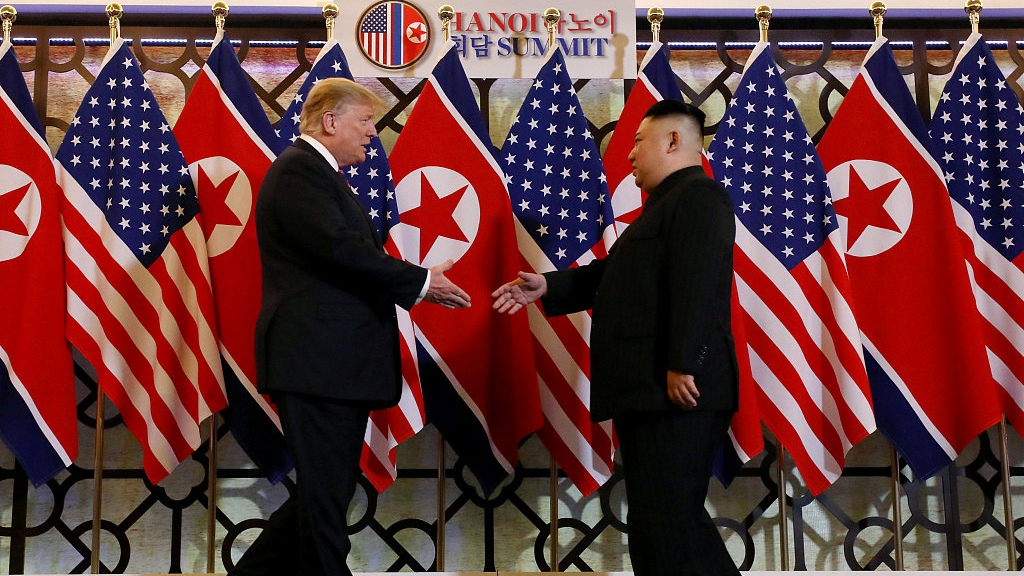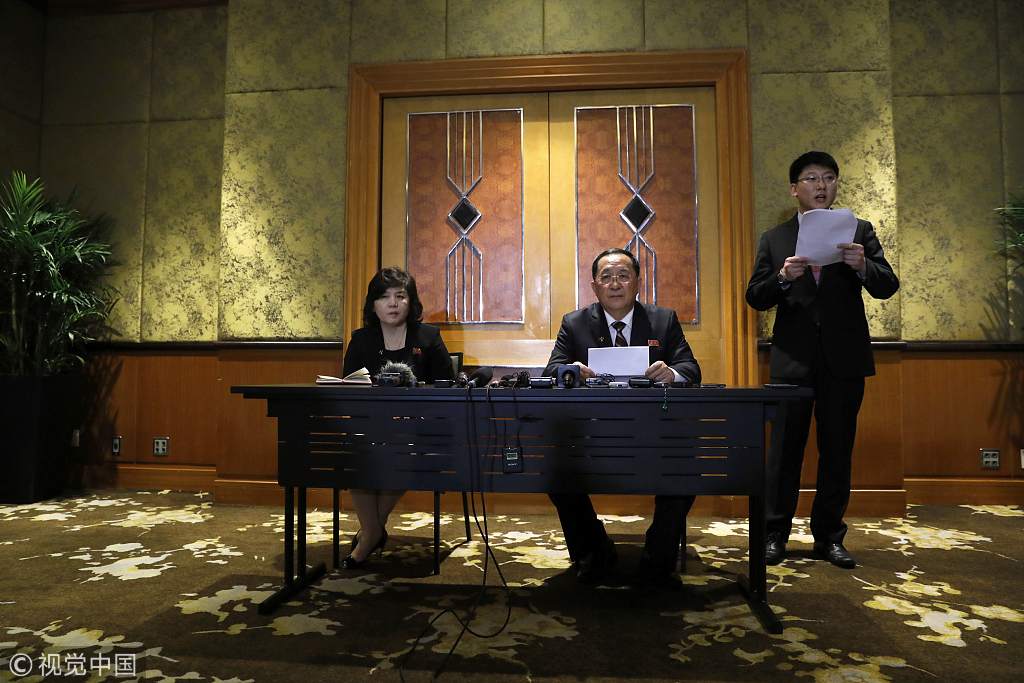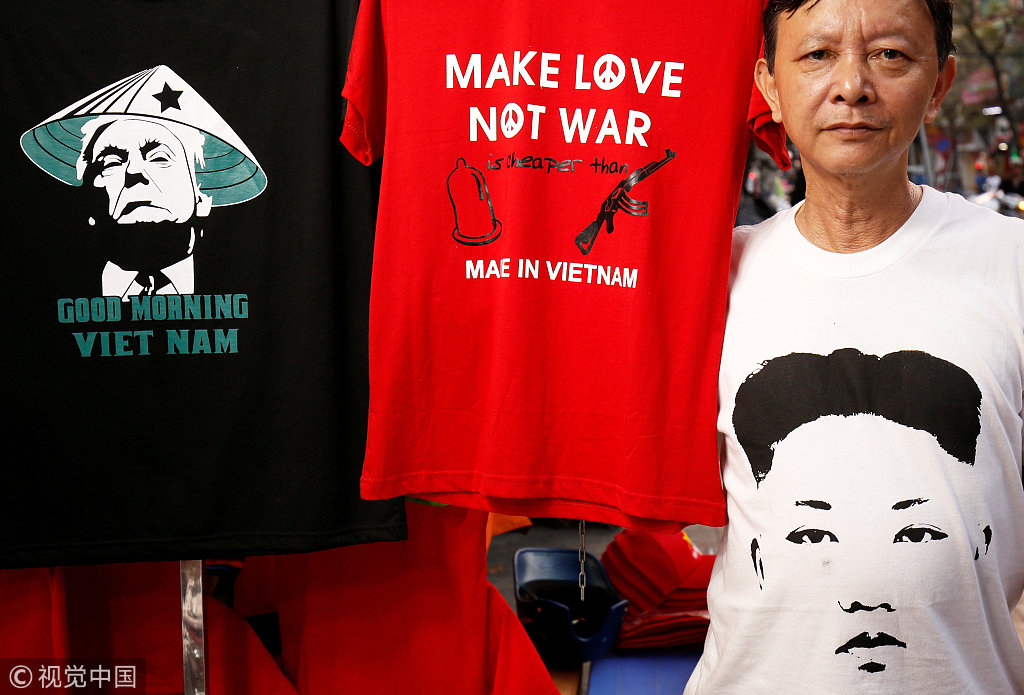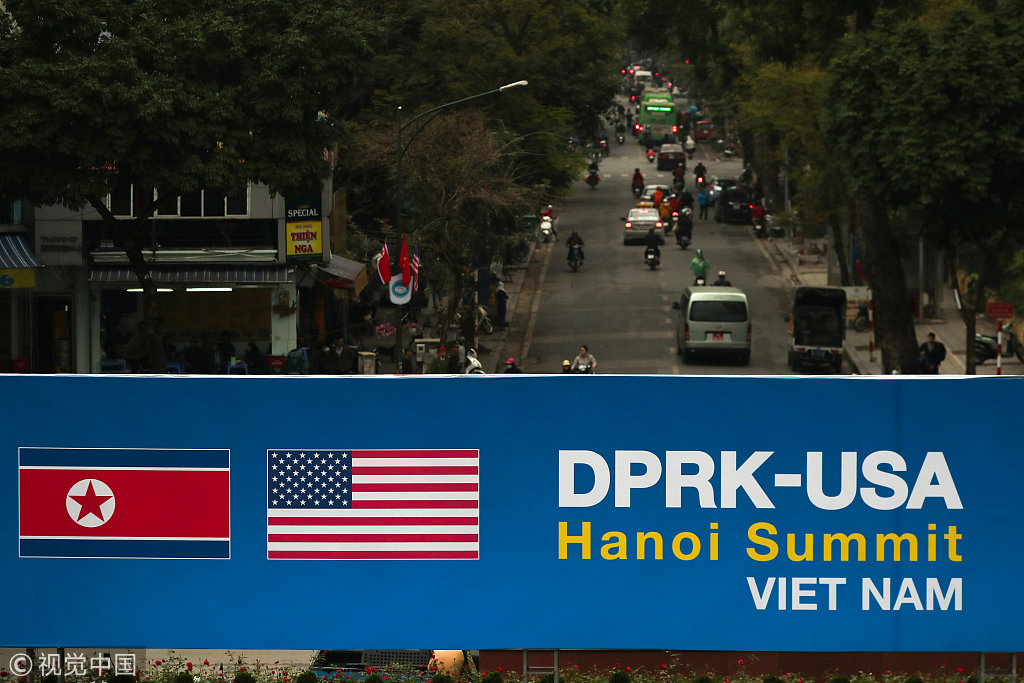
Opinion
14:54, 09-Mar-2019
Trump's DPRK facade unravels
Tom Fowdy

Editor's note: Tom Fowdy, who graduated from Oxford University's China Studies Program and majored in politics at the Durham University, writes about international relations focusing on China and the Democratic People's Republic of Korea.The article reflects the author's views, and not necessarily those of CGTN.
As the fallout over the Hanoi summit continues, yesterday saw a press conference take place with the U.S. department of state which raised eyebrows. Analysts moaned as a spokesman for the department made it clear that American demands concerning the denuclearization of Pyongyang were set in stone: that is, an insistence upon the “all or nothing” approach demanding the DPRK concede its entire nuclear program before receiving any kind of sanctions relief, with no apparent room for compromise.
What proved more disturbing however was now a “requirement” that this goal should be completed within the end of the Trump administration's presidential term, thus before January 2021.

A translator speaks as Ri Yong-Ho,DPRK's foreign minister, center, and Choe Son Hui, DPRK's vice foreign minister, left, listen during a during a news conference following the DPRK-USA Hanoi Summit in Hanoi, Vietnam, March 1, 2019. /VCG Photo.
A translator speaks as Ri Yong-Ho,DPRK's foreign minister, center, and Choe Son Hui, DPRK's vice foreign minister, left, listen during a during a news conference following the DPRK-USA Hanoi Summit in Hanoi, Vietnam, March 1, 2019. /VCG Photo.
The press conference is just another in a stage of unwelcome developments over the next few days, which has included a more prominent role by John Bolton, a rebuilding of test facilities by Pyongyang and a news announcement by the Korean Central News Agency that “self-reliance” is the key the country's approach to the U.S.- Despite the fact that hostile actions and rhetoric have not yet formally resumed, everything seems alarming, as if the good work done since last year stands to be unraveled rapidly.
But this press conference stands out exceptionally to illustrate the reasons why. The Trump administration's policy on the DPRK continues to make persistent mistakes.
The conception, ingrained within it from the start, to which Kim Jong Un can be coerced to surrender his nuclear weapons in their entirety is a delusion by which they stubbornly refuse to part with. As much as the administration has chosen and prefers now, to pursue diplomacy, a deal continues to be diluted and derailed by this near religious roadblock.
In addition, grotesque exaggerations of the policy's success by both the administration and the media have also underestimated Pyongyang's resolve, and poorly accounts for their responses to it.

Vietnamese shop owner Truong Thanh Duc displays t-shirts for sale with images of U.S. President Donald Trump and DPRK leader Kim Jong Un ahead of USA-DPRK Summit in Hanoi, Vietnam, February 21, 2019. /VCG Photo.
Vietnamese shop owner Truong Thanh Duc displays t-shirts for sale with images of U.S. President Donald Trump and DPRK leader Kim Jong Un ahead of USA-DPRK Summit in Hanoi, Vietnam, February 21, 2019. /VCG Photo.
The “maximum pressure” policy of the Trump administration was conceived in early 2017 after a policy review took place on Washington's approach Kim Jong Un's regime. It was christened by Republican hardliners, who, returning to positions of influence, were dying for a more assertive and militaristic approach to Pyongyang following a belief the Obama administration had been too passive.
The policy involved whipping up hysteria over the DPRK's nuclear threat to the United nations, upping sanctions as tight as possible and using a threat of pre-preemptive military action to force the country towards negotiating its nuclear program nor just in small deals, but in its entirety. It was to be a direct bid to claim as much leverage as possible in the view of forcing changes to the country to entirely suit American demands- a classic application of Neo Conservatism.
The DPRK responded to the shifting climate by upping the ante, utilizing a spree of missile tests to intensify its own leverage in resistance to American pressure. This was not well understood, as the country's actions are almost never given a rationale in popular media.
Still, after about a year of confrontation and threats of belligerence between the two sides, a phase of dialogue opened up in 2018 initiated by ROK's Moon Jae-in, a more much conciliatory voice towards Pyongyang. The administration was happy to make the claim that their efforts had brought Pyongyang to its knees, narratives which were echoed uncritically throughout most of the media.
In claiming success, Trump seemed to believe his own hype and overstate his influence on the regime, repeatedly. He believed that having acquired so much leverage in terms of sanctions he could bribe Kim into full denuclearization with lucrative promises of widespread foreign investment.

A billboard promoting the upcoming DPRK-USA summit is seen at the DPRK-USA summit's media centre in Hanoi, Vietnam, February 23, 2019. /VCG Photo.
A billboard promoting the upcoming DPRK-USA summit is seen at the DPRK-USA summit's media centre in Hanoi, Vietnam, February 23, 2019. /VCG Photo.
Indeed, he has not ceased once to talk about the country's “vast economic potential” and touting it as a “powerhouse." In tandem with this, what yesterday's press conference highlighted was the persistence of the belief that the country has been so crippled by sanctions that they will eventually and undoubtedly, cave in to America's maximum demands.
This reflects the broader thinking of the administration that they do not need to offer relief or a “step by step” approach, as they have the “leverage” to push to get everything they want and thus to cede that would be to render an advantage to the “enemy” of the DPRK and place themselves in a weaker position than what they were before.
It is this frame of mind, the idea that offering the country anything on its own terms constitutes a form of appeasement and an enabling of aggression, that has stubbornly glued the policy line together and thus made it so difficult to deviate from in deal making situations.
But it is wrong, seriously wrong. It does not need to be said again that the DPRK will not opt for unilateral capitulation to American demands and is not desperate. Sanctions hurt, but they have ways of persevering through them.
Instead, it will continue to advocate resolve and resistance. Pyongyang does indeed want to make a deal, but when it said it has placed on the table all it can realistically offer, it wasn't lying. It knows fine well that if it has to increase its nuclear and missile capability further to strengthen its hand against Trump, then so be it. Given this, the Trump administration's policy towards the country continues to make grave mistakes, simply by where and how it sets the parameters.
It could well be a success. It very nearly was, yet it continues to fall flat on its reliance of a hash miscalculations, unreasonable goals and dogmatic assumptions which will, as most things it is doing, will hurt Washington's credibility for years to time. This press conference was a cold nod to that reality.
(If you want to contribute and have specific expertise, please contact us at opinions@cgtn.com.)

SITEMAP
Copyright © 2018 CGTN. Beijing ICP prepared NO.16065310-3
Copyright © 2018 CGTN. Beijing ICP prepared NO.16065310-3